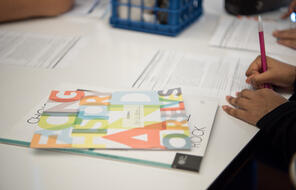Still Me Inside
At a Glance
Subject
- Social Studies
- Culture & Identity
Mai Goda describes how changing her appearance affected the way that others perceived her identity and how she thought about herself:
“I need a change!”
And so on that single whim, I cut my long black hair, streaked it bright red, and, to top it off, pierced my eyebrow. I had gone from dork to punk in a week, and as trivial as it seems, this transformation has had a great effect on my life.
As long as I can remember, I had always been a good girl. In school, I got decent grades and never was in trouble. At home, I tried not to give my parents too much grief. But more than that, I had the “look” of a good girl. People always stereotyped me as a quiet, studious, Asian girl. Friends’ parents often asked if I played the violin or the piano. “No, the flute,” I’d say, and they would nod, not surprised. Walking around with my long black hair over my face, I hid behind my stereotype. I felt somewhat obliged to appease the stereotype imposed on me.
Needless to say, heads turned the day I walked into school sporting a new, short, bright red hairdo. I enjoyed the reaction and attention I received from my friends and teachers. I didn’t listen to my friends’ warnings about people seeing me differently, people who frowned on a “rebellious punkster.” After all, I was still the same person inside, so why should this change matter? I soon found out how naive I was.
One day, I was late for school and needed a pass from my vice principal. I was met by a surprisingly stern look. Writing one, his voice and stare were cold and condescending. Mistaking me for “one of those punk delinquents,” he left me with a warning: “Don’t make a habit of it.” Had I come to school late a week before, my vice principal would have said nothing. I was not used to this discriminating treatment, and I felt angry, embarrassed, and somewhat defeated. Now every time I go to the mall, suspicious eyes follow me. Store clerks keep a cautious watch. But the worst was yet to come.
It was the night of our music recital for advanced students. For weeks, I had prepared my piece, and I was excited. The room was packed with parents waiting to hear their children. But, as soon as I walked into the room, all attention was focused on my head. As I sat waiting my turn, I felt the critical eyes of the parents.
I performed well but felt awful. Afterward, I still saw those disapproving looks as they walked out with their children. I even overheard a friend being lectured on how she shouldn’t color her hair or pierce her face to become a “punk like Mai.” Once again, I was ready to go home feeling angry when my friend’s father stopped me.
“You were very good tonight. At first I didn’t recognize you,” he said, looking at my head.
“Oh yes, I look very different from last time, don’t I?”
“Well, you played even better than last year. Look forward to hearing you again.”
I went home feeling good, as if I had finally won a battle. Now the stern look of the vice principal, the suspicious stares of the store clerks, and the disapproving eyes of my friends’ mothers didn’t bother me. I was still the same person inside, punk or not. There was nothing wrong with me; it was the other judgmental people who had the problem. I regained my confidence.
I still get looks and the stares, but it doesn’t upset me. In a way, I traded in one stereotype for another, but this time I enjoy proving them wrong. People are surprised to see me getting good grades and applying to good colleges. They’re surprised to hear me play the flute so well. And they are absolutely shocked to see me standing in front of the football field, red hair shining in the sun, conducting the marching band.
As for my red hair, I re-dye it occasionally to keep it bright, burning red. It seems to give me the power to fight against stereotypes forced on me and gives me the confidence that I never had before. 1
- 1Mai Goda, “Still Me Inside,” in Chicken Soup for the Teen Soul: Real-Life Stories by Real Teens, ed. Jack Canfield, Mark Victor Hansen, Stephanie H. Meyer, and John Myer (Backlist, LLC, 2012), 261–263. Reproduced by permission of Backlist, LLC.
Supporting Materials
How to Cite This Reading
Facing History & Ourselves, “Still Me Inside,” last updated June 17, 2017.
This reading contains text not authored by Facing History & Ourselves. See footnotes for source information.













